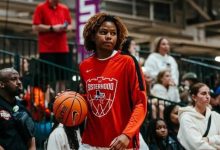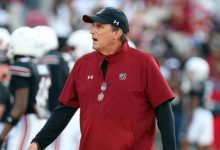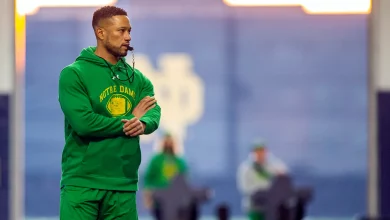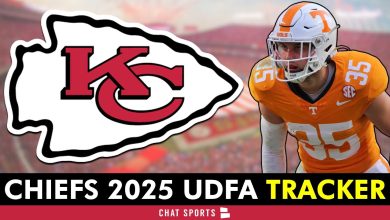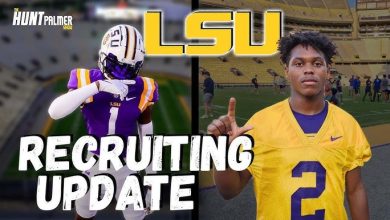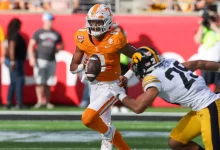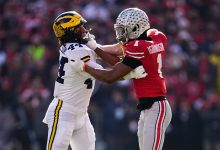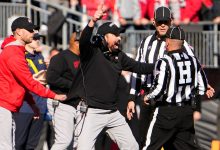Former Miami Hurricanes Coach Mark Richt Jokes Carson Beck Got Paid More Than Him After Transfer From Georgia, Highlights NIL Era Impact.
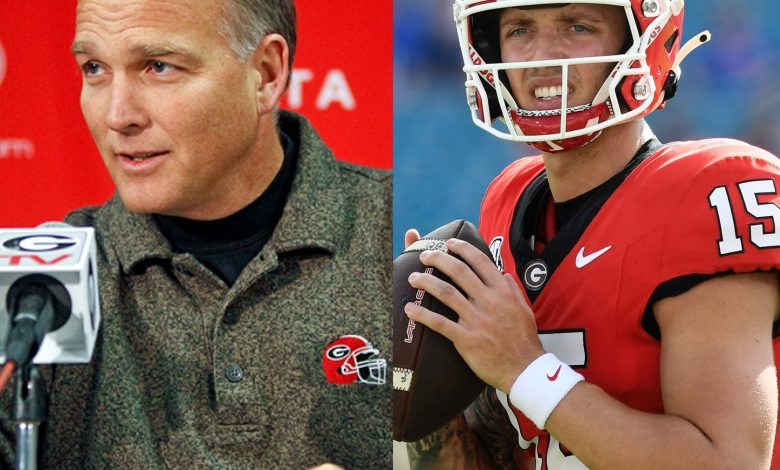
In a moment that blended humor, nostalgia, and serious commentary on college football’s shifting dynamics, former Miami Hurricanes head coach Mark Richt recently shared a playful jab aimed at new Hurricanes quarterback Carson Beck. Speaking at a university function, Richt joked that Beck likely “got paid more than I ever did” when he transferred from Georgia to Miami—an offhand remark that spoke volumes about the transformative impact of Name, Image, and Likeness (NIL) in today’s college football landscape.
Though the line drew laughter, the underlying message was clear: college football, particularly at the highest levels, has entered a new era, one where top athletes are receiving financial compensation on a scale that would have been unthinkable even five years ago. Beck’s high-profile move from the back-to-back national champion Georgia Bulldogs to the Miami Hurricanes symbolized not just a strategic transfer for on-field success, but also the kind of off-field opportunities now driving player decisions.
Beck’s Journey from Athens to Coral Gables
Carson Beck was never short on talent or expectations. As a standout at Georgia, he showed promise as the heir apparent to Stetson Bennett, eventually stepping into the starting role in the 2023 season. Despite statistical success—including 3,941 passing yards and 24 touchdowns—Beck’s 2024 campaign ended in disappointment, with the Bulldogs falling short of the College Football Playoff.
Faced with intense scrutiny and quarterback competition, Beck surprised many by entering the transfer portal in early 2025. What followed was a recruiting whirlwind, but Miami emerged as the surprise victor—landing not just a proven quarterback, but one with a high football IQ, SEC pedigree, and, crucially, market value in the NIL space.
While financial specifics are rarely confirmed, insiders across the NIL landscape estimated that Beck’s transfer included a multi-million-dollar package from Miami’s collective. From housing stipends to endorsement deals, the quarterback reportedly landed one of the most lucrative NIL agreements in the program’s history.
Mark Richt’s Quip — and What It Really Means
When Mark Richt delivered his tongue-in-cheek jab about Beck’s NIL earnings, it wasn’t just an offhand joke. Richt, who coached the Hurricanes from 2016 to 2018 and also spent 15 seasons leading the Georgia Bulldogs, knows intimately how much the college football coaching and recruiting landscape has changed.
“It’s a different world now,” Richt said. “Back when I was coaching, we used to tell recruits about academics, tradition, and development. Now, you need to talk about branding, marketing agencies, and income projections. Carson Beck probably makes more than my entire coaching staff did back in 2005.”
His comments, while humorous, underscore the tectonic shift in how programs recruit and retain talent. NIL collectives are now as integral to a program’s success as strength coaches and offensive coordinators. For Richt, who coached in both the pre- and post-NIL eras, Beck’s move highlights the era’s defining truth: talent follows opportunity, and opportunity now includes financial security.
Beck Embracing the Role
Since his arrival in Coral Gables, Beck has embraced his new role with professionalism and poise. At spring practices and media appearances, he’s expressed gratitude for the opportunity and a hunger to prove himself.
“I didn’t come here just to cash in,” Beck said. “I came to win, to lead, and to be part of something special. The NIL stuff is part of it, sure, but it’s not the reason. Coach [Mario] Cristobal laid out a vision that made sense to me, both on the field and off it.”
Still, the “off-field” part can’t be ignored. Beck has already signed endorsement deals with a regional bank, a sports nutrition brand, and a South Florida car dealership. His social media presence has ballooned, and he’s become one of the most marketable athletes in the ACC overnight.
Mario Cristobal’s Vision and Expectations
For Miami head coach Mario Cristobal, landing Beck was about more than filling a position. It was a statement—about where the program is heading and what kind of talent it now expects to attract.
“Carson Beck is a winner,” Cristobal said. “He understands what it takes to lead a locker room, compete at the highest level, and elevate everyone around him. We’re building something real here, and guys like Carson are key to that.”
Cristobal, like many top coaches today, has had to evolve rapidly in the NIL era. His background as a no-nonsense, hard-nosed recruiter has served him well in the transition. Under his leadership, Miami has assembled a robust NIL infrastructure capable of competing with SEC powerhouses, a fact clearly evidenced by Beck’s commitment.
NIL’s Broader Impact
Beck’s journey and Richt’s comment raise important questions about NIL’s broader impact on college football. While many see NIL as empowering athletes—finally allowing them to capitalize on their labor—others warn of unintended consequences: pay-for-play systems, recruiting imbalances, and locker room divides.
Even within programs, the disparity in earnings can become an issue. One Miami assistant, speaking anonymously, acknowledged the challenge of “balancing the business side with the team side.”
“Guys see what someone like Carson is making, and it changes the dynamic. That’s just the reality now,” the coach said. “It’s on us to build a culture where everyone understands their value, even if they’re not the ones doing car commercials.”
For Beck, however, the key will be performance. If he delivers on the field and leads Miami back to ACC contention, any whispers about NIL money will fade into the background.
A Symbol of the New Era
Carson Beck is more than a quarterback transfer—he’s a symbol of where college football is heading. His decision to leave Georgia, a program that had built a dynasty, for the uncertain promise of Miami, illustrates how the calculus has changed. It’s no longer just about depth charts and championships. It’s about branding, opportunity, exposure, and yes—money.
Mark Richt’s lighthearted comment captures this evolution with clarity. Once upon a time, the idea that a college quarterback could out-earn his coach was absurd. Now, it’s not only possible—it’s happening.
As Beck leads Miami into the 2025 season, all eyes will be on him. Can he justify the hype and deliver results on the field? Can he navigate the pressures that come with being the face of a resurgent program in the NIL spotlight?
If he can, Richt’s joke will be remembered not just as a humorous anecdote, but as a moment that captured the dawn of college football’s brave new world.
Carson Beck’s move to Miami, fueled by both football ambition and NIL realities, represents the new normal. For coaches like Mark Richt, who straddled two vastly different eras, the change is both fascinating and jarring. And for Miami fans, the hope is simple: that Beck is worth every penny—and then some.

